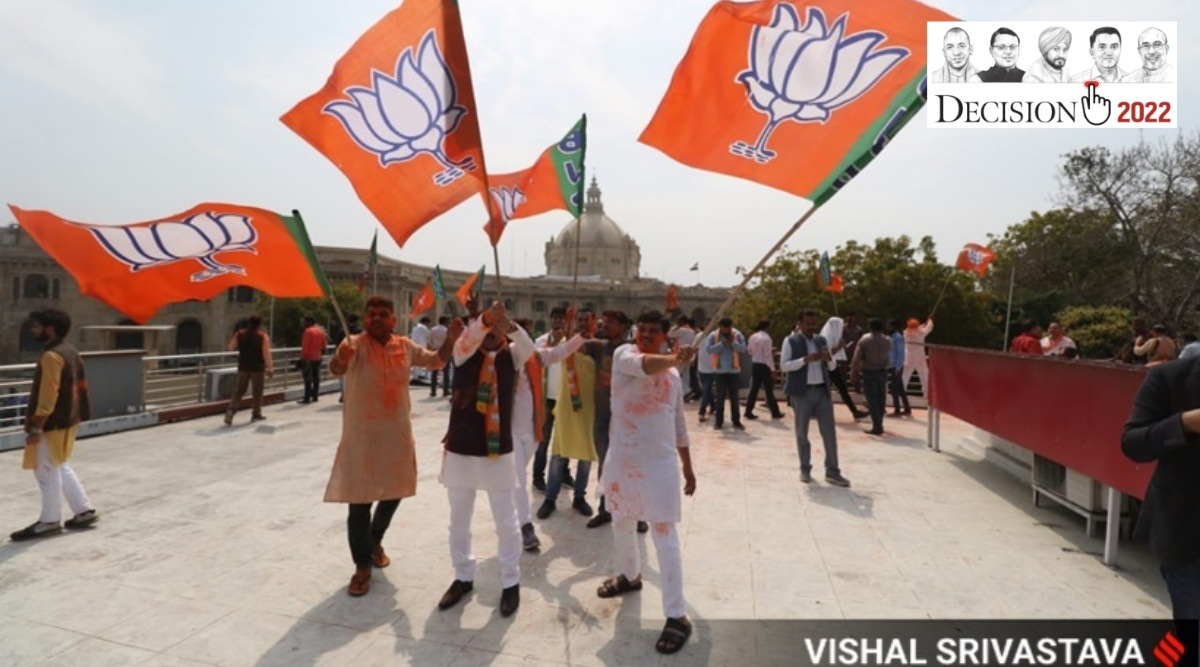 In 2017, the BJP had won 69 among the SC-reserved seats. (File)
In 2017, the BJP had won 69 among the SC-reserved seats. (File) IN THE Assembly seats reserved for Scheduled Castes (SC), where support of Dalit and non-Dalits for any political party is tested more than in the general category seats, the BJP and allies won more seats than the Samajwadi Party (SP) and its allies in the 2022 Assembly elections. However, this time the BJP’s performance on such seats was poor in comparison with 2017 while the SP has now increased its tally on such seats.
Of the total 403 Assembly seats in the state, 84 are reserved for SCs and two for STs (Obra and Duddhi). The BJP won both the ST reserved seats in 2022 as it had done in 2017 too when the party put up its best performance in the state in terms of Assembly elections till date.
In 2017, the BJP had won 69 among the SC-reserved seats. The SP had won seven, BSP got two, Suheldeo Bharatiya Samaj Party (SBSP) had won three, Apna Dal (Sonelal) had won two and one seat was won by an Independent candidate. The Suheldev Bharatiya Samaj Party (SBSP) and Apna Dal (S) both were BJP’s allies in the 2017 elections. In total, the BJP and allies had won 74 seats then.
In the 2022 elections, the results of which were declared on Thursday, the BJP and its ally Apna Dal (S) collectively won 63 seats, 11 less than in 2017. Another BJP ally, Nishad Party, did not contest on any reserved seat.
In the 2022 elections, the SBSP was in alliance with SP and Rashtriya Lok Dal (RLD) and other smaller parties. The SP won 16 reserved seats, SBSP won three seats and RLD emerged the winner on one seat.
In total, SP and allies collectively won 20 SC reserved seats. This was a better performance than in 2017, when the SP itself had won only seven seats while its ally Congress had won none.
In 2017, the BSP had won two SC reserved seats but it won none in 2022. The BSP, in the recent elections, fielded Dalit candidates on unreserved seats such as Karhal and Jaswantnagar as part of its social engineering.
The SP improved its tally in reserved seats than 2017 but BJP recorded a higher victory margin. The average margin of votes for victory on SC seats for BJP in 2022 was 28,667. However, SP’s average margin was 13967, almost half to BJP’s average margin. That difference indicates that out of Dalit votes that shifted from BSP, BJP got that larger share than the SP.
As for the reserved seats it won in 2017, the BJP lost nine to SP and one to RLD in 2022.
In an attempt to reach out to Dalit voters before the Assembly polls, particularly those from Jatav community that forms a chunk of BSP chief Mayawati’s vote base, the BJP had projected party national vice-president Baby Rani Maurya, a former Uttarakhand governor and Agra mayor, as its Dalit face in the state. The BJP has organised functions to felicitate her, ensuring attendance of people from Scheduled Caste communities in various parties of the state. For these functions, the BJP had also highlighted Maurya’s Dalit identity, by adding ‘Jatav’ to her name in hoardings and formal communications. The BJP had also held ‘samajik pratinidhi sammelans’ to woo voters from different castes, including SCs and OBCs.
Baby Rani Maurya won the election from Agra Rural (SC reserve) with a margin of 76,608 votes. The BSP finished second.
SCs constitute more than 23 per cent of the population in UP, and nearly half of them are from sub-caste Jatav. They are in decisive positions in more than 50 Assembly constituencies in western and eastern regions of UP.
In the run-up to the 2022 Assembly elections, the BSP had tried to emphasise on “bhaichara” (brotherhood) between SCs and upper castes, a social engineering experiment that had brought success for the party in 2007. The SP had deployed its leaders from SCs — mostly who had switched over from BSP in past couple of years — to reach out to Dalit voters. For the first time since the party was floated in 1992, SP also formed a dedicated wing for SCs — Samajwadi Baba Saheb Ambedkar Vahini, and appointed a Dalit leader who was with the BSP for 29 years to head this new wing.
- The Indian Express website has been rated GREEN for its credibility and trustworthiness by Newsguard, a global service that rates news sources for their journalistic standards.

